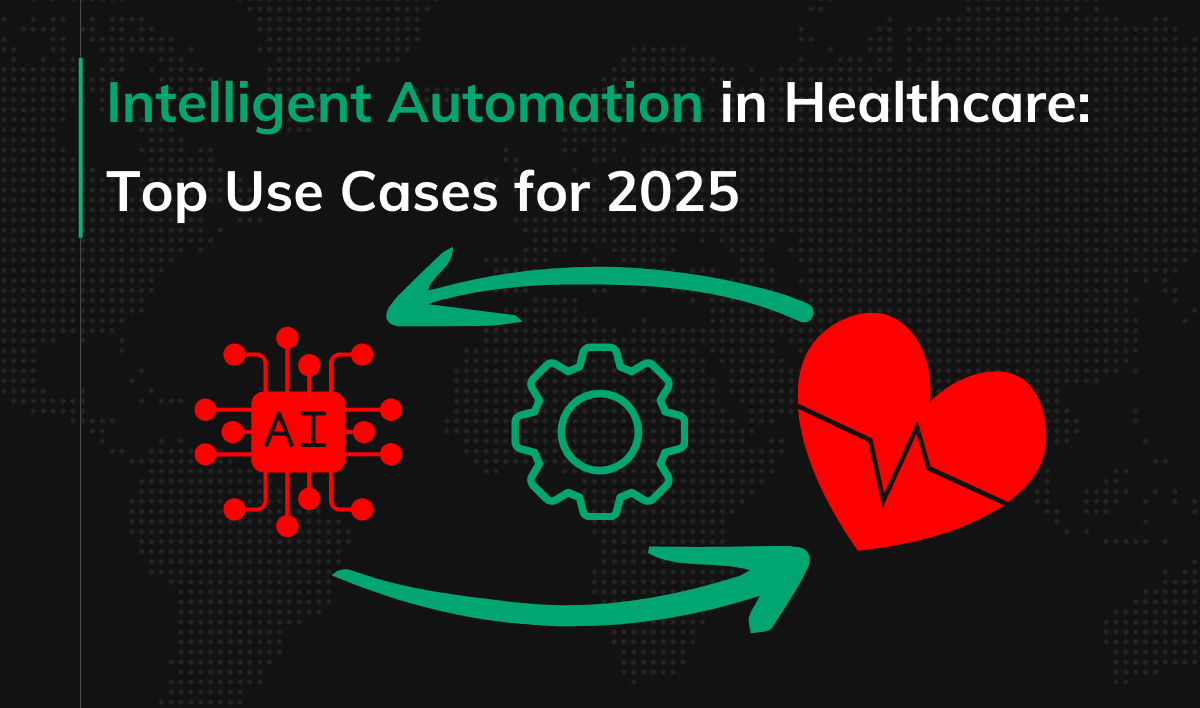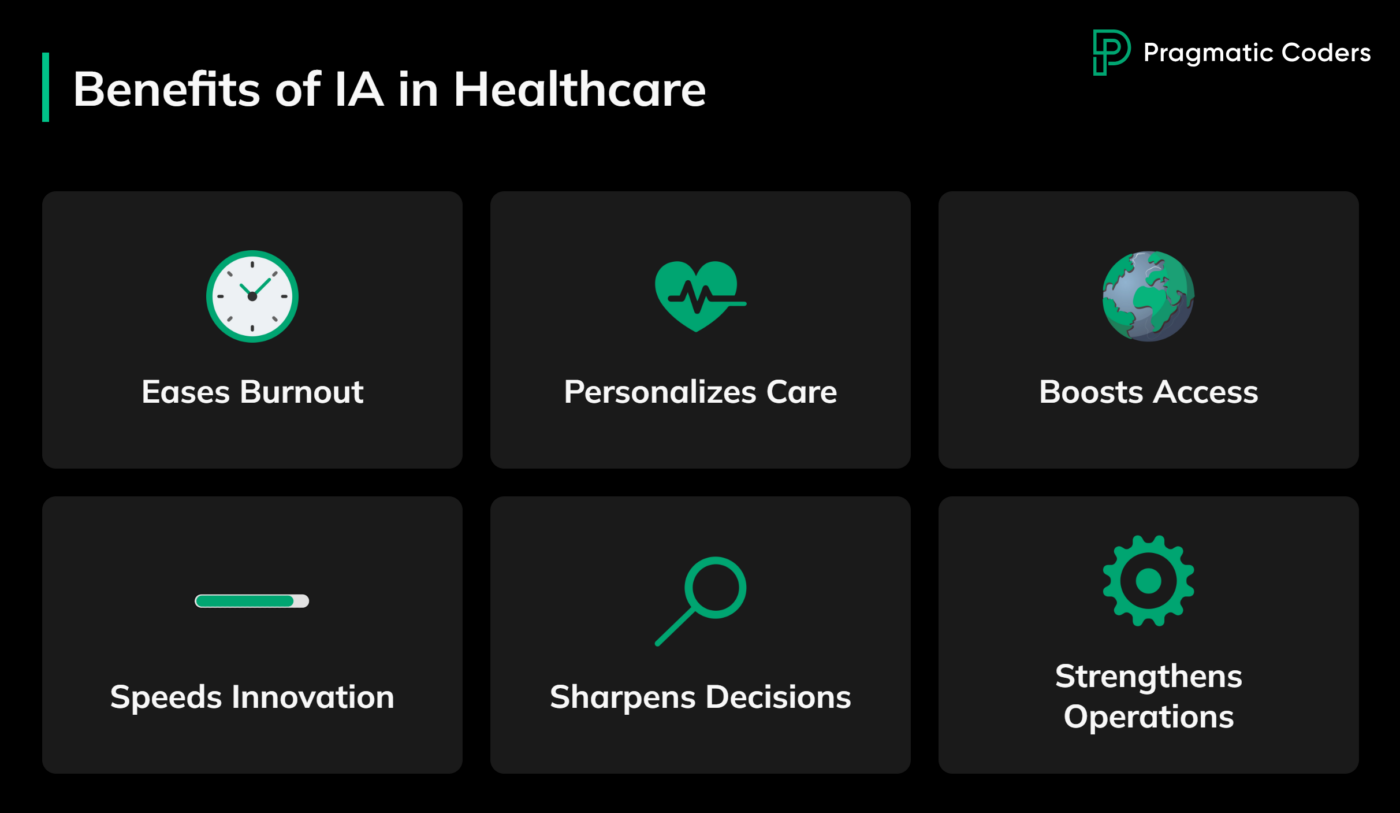Intelligent Automation in Healthcare: Top Use Cases for 2025

The healthcare industry is changing fast. By 2025, intelligent automation (IA) isn’t just a buzzword—it’s a must-have. Fueled by breakthroughs in artificial intelligence (AI), especially Generative AI (GenAI) and AI agents, IA is tackling tough challenges like workforce shortages, rising costs, and patient demands. Curious about how this tech is shaking things up? Let’s dive into the top use cases driving healthcare forward in 2025.
What is Intelligent Automation?
Intelligent automation is a combination of AI and RPA technologies. It’s not just about automating simple tasks anymore.
In 2025, IA includes AI agents—smart systems that think, plan, and act independently.
These agents can manage complex workflows, chat with patients, or analyze data without constant human nudges. Picture a digital assistant that doesn’t just follow orders but figures out the best way to get things done. That’s intelligent automation today: transforming healthcare from the ground up, even as the old challenges of implementing process automation persist.
Benefits of IA in Healthcare
IA is delivering bigger wins in 2025. Here’s how it’s making a difference:
- Eases Burnout: AI agents handle tedious tasks like billing or scheduling, saving clinicians up to 10 hours a week.
- Personalizes Care: By crunching massive datasets, IA tailors treatments to individual patients—think custom plans based on your DNA and lifestyle.
- Boosts Access: Telehealth and AI agents bring care to remote areas, breaking down barriers like distance or language.
- Speeds Innovation: AI slashes years off drug discovery, getting new treatments to patients faster.
- Sharpens Decisions: Real-time insights help doctors catch issues early and avoid mistakes.
- Strengthens Operations: Predictive tools keep hospitals running smoothly, even during a crisis.

Top Intelligent Automation Use Cases for 2025
Ready for the specifics? Here’s where IA shines in 2025 healthcare.
Autonomous Revenue Cycle Management (RCM)
- What’s Automated: Billing and coding processes, prior authorization, payment posting, and fraud detection. Here’s a review of more than a dozen end‑to‑end RCM suites for such automations.
- How It’s Done: AI algorithms detect and correct coding errors, GenAI analyzes clinical documentation for accurate codes, and autonomous AI agents interact with payer systems for prior authorization. Fraud detection is enhanced through AI analytics.
- Results: Improved accuracy, reduced denials, faster cash flow, and more efficient revenue cycles.
Smart Patient Scheduling & Engagement
- What’s Automated: Appointment management, patient inquiries, triage assistance, scheduling optimization, follow-ups, and medication reminders.
- How It’s Done: Conversational AI (chatbots, virtual assistants) handle patient interactions, while AI algorithms optimize scheduling based on provider availability and patient needs. Follow-ups and adherence reminders are automated.
- Results: Enhanced patient experience, reduced no-shows, improved operational flow, and better patient outcomes.
AI-Enhanced Clinical Documentation & Coding
- What’s Automated: Documentation creation, coding, and ensuring payer requirements are met.
- How It’s Done: Ambient AI listens to patient-provider conversations and generates clinical notes. GenAI and NLP automatically suggest accurate medical codes, and AI ensures documentation completeness.
- Results: Reduced clinician burnout, minimized errors, more efficient coding, and improved payer interactions.
Predictive Supply Chain & Inventory Management
- What’s Automated: Inventory forecasting, procurement, and real-time tracking of supplies.
- How It’s Done: IA analyzes historical data, seasonal trends, and usage patterns to predict demand. IoT sensors track inventory in real-time, and automated systems manage procurement.
- Results: Optimized inventory levels, minimized shortages, and reduced waste.
AI-Powered Diagnostics & Imaging Analysis
- What’s Automated: Image analysis for detecting diseases such as cancer or cardiovascular conditions.
- How It’s Done: AI algorithms analyze X-rays, CT scans, MRIs, and pathology slides, detecting subtle patterns that may be missed by humans. Multimodal AI integrates imaging with other patient data for comprehensive diagnostics.
- Results: Faster and more accurate diagnostics, earlier detection, and improved patient outcomes.
AI-Driven Clinical Decision Support (CDS)
- What’s Automated: Treatment recommendations, risk predictions, medical question answering, and adverse drug event detection.
- How It’s Done: AI analyzes vast amounts of patient data and current medical literature to provide actionable insights and support clinical decision-making.
- Results: Enhanced decision-making, improved care quality, and reduced risks.
Predictive Operations & Patient Flow Management
- What’s Automated: Patient volume forecasting, discharge predictions, staff deployment, and bed management.
- How It’s Done: Real-time data streams from various departments are analyzed using predictive models to forecast patient needs and optimize hospital operations.
- Results: Smoother patient flow, reduced delays, and maximized resource utilization.
Automated Compliance & Risk Management
- What’s Automated: Compliance auditing, cybersecurity monitoring, and risk management reporting.
- How It’s Done: IA continuously monitors systems for regulatory compliance, encryption standards, and potential security breaches. It automatically generates compliance reports and audits access logs.
- Results: Reduced manual effort, fewer compliance failures, and strengthened data security.
Accelerated Drug Discovery & Clinical Trials
- What’s Automated: Drug candidate discovery, trial design, patient recruitment, and trial monitoring.
- How It’s Done: AI processes biological, chemical, and clinical data to identify promising drug candidates. GenAI aids in regulatory submission automation, while AI improves trial design and patient recruitment.
- Results: Faster drug discovery, more efficient clinical trials, and accelerated time-to-market for new therapies.
The Power of AI Agents: A Game-Changer for 2025
Healthcare AI agents are stealing the spotlight in 2025. These aren’t your average chatbots—they’re intelligent systems that plan, reason, and execute complex tasks with minimal human input. Think of them as digital teammates, transforming how healthcare works. Here’s a closer look at their role, capabilities, and what’s at stake.
What Are AI Agents?
AI agents go beyond basic automation; they can:
- Orchestrate Workflows: Handle multi-step processes, like prior authorizations, by pulling data from EHRs, contacting payers, and tracking progress.
- Process Multiple Data Types: Analyze text, images, voice, and lab results for a holistic view, like summarizing patient histories for doctors.
- Communicate Naturally: Engage patients via chat or phone, answering questions or guiding them through care plans in multiple languages.
- Adapt on the Fly: Adjust actions based on real-time data, like rescheduling appointments when a provider’s availability changes.
They’re not fully autonomous yet (for safety reasons)—especially in clinical settings, where human oversight is critical. But their ability to tackle complex tasks is a leap forward.
Key Applications of AI Agents in Healthcare
AI agents are everywhere in 2025, with standout uses:
- Prior Authorizations: Agents like Infinitus AI’s Eva navigate payer portals, submit documents, and follow up, slashing delays from days to hours. This saves staff time and speeds up care.
- Patient Engagement and Scheduling: Virtual assistants, like ones offered by Hyro AI, answer questions 24/7, send personalized reminders, and guide patients through hospital navigation. They also coordinate multi-appointment visits, factoring in specialists, equipment, and patient needs.
- Clinical Support: Agents summarize patient data for doctors, flag incomplete notes, or pull relevant research.
- Trial Coordination: AI Agents match patients to trials, monitor progress, and automate reporting.
Strategic Impacts and Challenges
AI agents are a big deal, but they come with big questions:
- Workforce Shift: They can cut admin work by up to 41%, easing burnout. But staff need retraining to work alongside AI, and some roles may vanish. How will leaders manage this transition?
- Integration Needs: Multiple agents from vendors like Google or Salesforce risk creating new silos. Unified platforms, like Google’s Agent Garden, are critical to keep systems connected.
- Ethics and Safety: Agents handling clinical tasks need tight governance to avoid biases or errors. HIPAA compliance and transparent algorithms are non-negotiable. Can healthcare keep up with regulation?
- ROI Potential: Early adopters see huge efficiency gains, with some already reporting 30% cost savings. Outcome-based pricing—paying for results like faster authorizations—is gaining traction. Will this model scale?
Why It’s a Big Deal
AI agents aren’t just automating tasks—they’re redefining relationships. They handle phone calls, patient chats, and insurer negotiations, areas once thought too “human” for tech. This shift raises a question: as agents take on more, how do we preserve the human touch in care? Balancing their power with ethical oversight will shape healthcare’s future.
Conclusions
Intelligent automation is a powerful tool capable of transforming healthcare. AI agents and advanced IA tech are cutting burnout, personalizing care, and speeding up breakthroughs. For leaders, the challenge is clear: don’t just dip a toe in. Transform whole systems, train your team, and keep ethics front and center.








